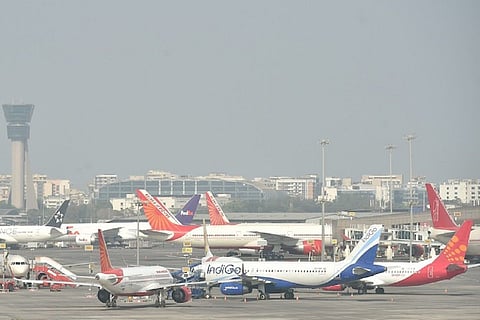

Towards the end of March, India banned all domestic as well as international flights to curb the spread of COVID-19. The aftermath saw several airlines face heavy losses, execute layoffs, and send employees on leave without pay. The situation continues to look grim, and experts say that flights may not resume full operations anywhere from six months to a year, or even more, from now.
International flights
Sudhakar Reddy, president of the Air Passengers Association of India (APAI), says that it is unlikely that flights will resume at least till September 2020. “It’s a humongous task. If one has to maintain social distancing, they would have to go to the airport 3-4 hours in advance. We may also see new norms – for example, I believe whenever flights resume, they should not allow hand baggage. That way, at least people coming in contact with each other’s hand luggage can be avoided,” he tells TNM.
“Perhaps some countries that do not have major incidence of coronavirus – such as Maldives, Sri Lanka, Bhutan – may resume flights. But then, they would also have to devise a strict system of checkups for arriving passengers,” Sudhakar adds. “Perhaps Dubai and Middle Eastern countries will also resume flights to India once the situation is under control. I believe there are many Indians there who are desperate to return and be with their families.”
Captain Mohan Ranganathan, a former airline instructor pilot and air safety analyst, says that till quarantining passengers remain a rule, flight operations will not resume fully.
"Until all countries lift restrictions on visas, and there is a clear indication that passengers won’t have to face quarantine when they land in the destination countries, I don’t think flights will resume operations internationally,” he says.
Domestic flights
Sudhakar says that there may be some skeletal airline services resuming from May 4, if the national lockdown is not extended further. “Perhaps airlines will reduce the number of flights they operate out of a city. I think these minimal flights, if at all, will only be between some major airports.”
However, Mohan says that he does not realistically see domestic flights resuming fully for another year at the very least.
“If they do operate, they will be able to do so only at 1/3rd of their capacity due to social distancing norms. They will not be able to sell cheap tickets; and the necessity of security and testing would ensure that anyone with even a common cold has no chance of traveling,” he says.
“I expect many airlines will fold up. The 21-day lockdown was bad enough for them, but this extension will cost them even more. The government is anyway giving peanuts to those who are losing jobs or have to migrate. If they try to bail out private airlines, they will receive a lot of flak – meaning airlines are unlikely to receive government help,” Mohan adds.
Air travel will become unaffordable
Given that airlines will most likely have to operate at 1/3rd capacity to maintain social distancing, the tickets will get more expensive.
“Family travel becomes out of question – only people who absolutely need to travel will travel. And especially without airlines giving refunds on cancellation, people are going to be very wary,” points out Mohan.
Further, airports are also likely to charge passengers more. “Apart from aircrafts, the sanitization of the airports will also have to be upped,” says Sudhakar. “The investments that have gone into airports are based on utopian projections, not realistic ones. Every now and then, we see news that xyz airport is busiest and so on. But at this time, this investment is going to cost passengers, who will be charged more to keep the airports afloat,” Mohan adds.
As air travel is likely to get very expensive, experts predict that there is going to be a large scale migration to trains and cars for inter-state travel, especially if the geographical distance is not too much.